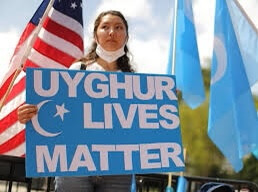
Lord Alton of Liverpool House of Lords
London
SW1A 0PW
Lord (Tariq) Ahmad of Wimbledon
Minister of State for South Asia and the Commonwealth
Prime Minister’s Special Representative on Preventing Sexual Violence in Conflict
King Charles Street London
SW1A 2AH
21 September 2021
Dear David,
Thank you for your correspondence of 21 March sharing concerning allegations of Chinese companies advertising the sale of hair from Uyghur women in Xinjiang on Facebook.
Please accept my apologies for the delay in responding to you.
As you know, the UK remains deeply concerned about the human rights situation in Xinjiang including the extra-judicial detention of over a million Uyghur Muslims and other minorities in “political re-education camps” since 2017; systematic restrictions on Uyghur culture and the practice of Islam; and extensive and invasive surveillance targeting minorities.
Reports that the hair of Uyghur and other minority women detained in prisons and “political re-education camps” is being used for profit is deeply disturbing, and such practices are unacceptable. No business, whether in the UK or abroad, should profit from the human rights violations taking place in Xinjiang.
In response, the Government is taking robust action.
On 12 January, the Government announced a series of measures to help ensure that UK businesses and the public sector are not complicit in the human rights violations occurring in Xinjiang. These measures include a review of export controls as they apply to Xinjiang, the introduction of financial penalties for organisations that fail to comply with their obligations under the Modern Slavery Act, and new, robust guidance to UK businesses on the specific risks faced by companies with links to Xinjiang.
These measures will help ensure that no British organisations – government or private sector, deliberately or inadvertently – are profiting from or contributing to human rights violations against the Uyghurs or other minorities.
These measures demonstrate the Government’s commitment to taking action and defending our values, and we do not rule out taking further measures in the future.
We have taken other measures too. On 22 March, the Government announced that it had imposed, under our Global Human Rights sanctions regime, asset freezes and travel bans against four Chinese government officials and one entity responsible for enforcing the repressive security policies across many areas of Xinjiang. These measures were taken alongside the US, Canada and the EU, sending a clear message to the Chinese Government that the international community will not turn a blind eye to such serious and systematic violations of basic human rights.
You also asked whether the Government will commit to lead efforts at the UN to establish a mechanism to investigate the situation of Uyghurs in China and preserve evidence for future prosecutions.
The UK has consistently led international efforts to hold China to account at the UN, including by advocating for external monitors to be allowed access to Xinjiang. In February, in his address to the Human Rights Council, the former Foreign Secretary called on China to grant urgent and unfettered access to Xinjiang for the UN High Commissioner for Human Rights or another independent fact-finding expert. In May, the G7 Foreign and Development Minister’s communique expressed deep concern about human rights violations in Xinjiang and reiterated our call for independent experts to be given unfettered access to Xinjiang. On 22 June, a global UK diplomatic effort brought together 44 countries to support a joint statement at the UN Human Rights Council underlining the urgency of granting such access.
It is vitally important that China allows this without delay.
If China does not grant access, it will be important for relevant UN bodies and observers to consider the considerable volume of evidence that has emerged, including from satellite imagery and the Chinese authorities’ own documents.
The growing evidence of suppression of birth rates, partly based on official Chinese Government data, add to our deep concern about the situation in Xinjiang.
The UK has also funded credible research to better understand the situation in the region and its wider implications.
The Government is committed to tacking the issue of forced labour in Xinjiang and the impact on UK supply chains.
May I thank you for your continued engagement with the human rights situation in Xinjiang.
Yours sincerely,
LORD (TARIQ) AHMAD OF WIMBLEDON
Minister of State for South Asia and the Commonwealth
Prime Minister’s Special Representative on Preventing Sexual Violence in Conflict



